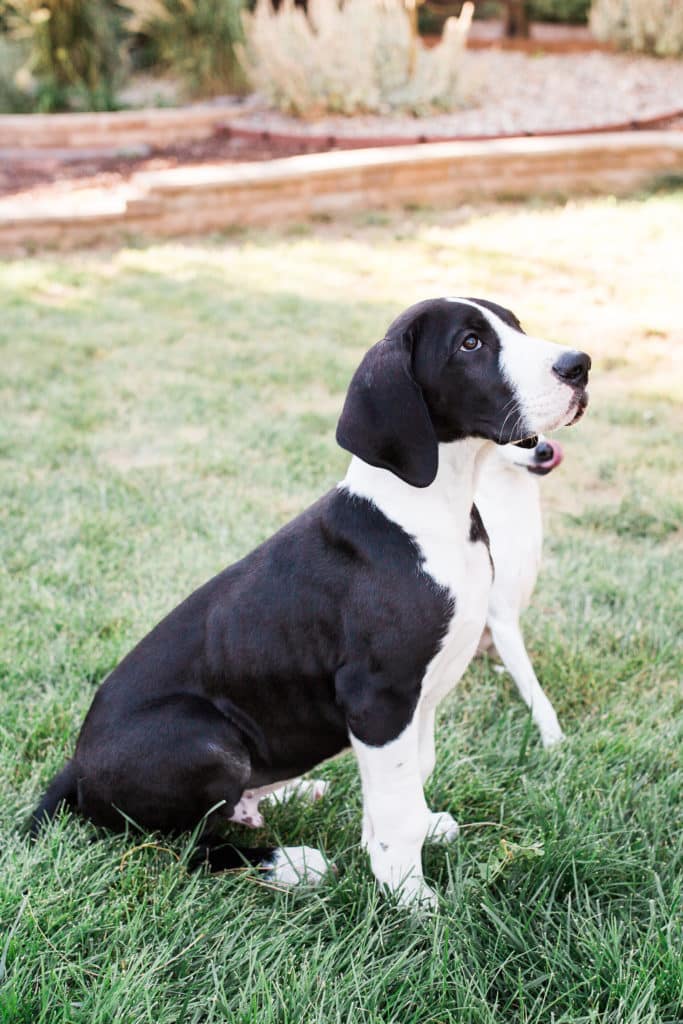Training your Great Dane puppy starts on day one with the practice of boundaries, routine and supervision.
Every Great Dane should be well socialized and well trained. They are giant breed dogs that can be hard to handle and intimidating when not taught appropriate behavior.
We highly recommend finding a highly qualified dog trainer with giant breed experience and beginning puppy classes as soon as possible.
Even if you think you know how to train your dog, gaining a fresh perspective and up to date training advice is super valuable! Not to mention, dogs that spend time learning in a group setting are also taught early how to ignore other dogs and ignore distractions.
AKC S.T.A.R. PUPPY
The AKC S.T.A.R. puppy program is a fun way to track your training goals and progress.
It is the ‘Kindergarten Graduation’ that leads naturally into the more intense requirements of the AKC Canine Good Citizen Program.
When you work with a trainer that has been certified as an AKC CGC Evaluator, you are also likely to also be working with an experienced trainer who is using modern training methods.
While participating in the AKC Training Programs isn’t required, it’s really fun if you are goals oriented, love recognition, and are interested in eventually appending an officially recognized title (‘CGC’) to your dog’s AKC registered name!
BENEFITS OF TAKING A PUPPY CLASS
When you and your Great Dane puppy take a class together, you will get to learn:
- Socialization basics, including confidence building and how to play politely with other puppies.
- Obedience basics including sit, down, stand, touch, leave it, name, come, heel and ‘go to your place’.
- Handling skills (how to train, reward and communicate with your dog according to the latest research in training and canine behavior).
- How to do all of those things with distractions.
- Basic puppy care, including advice for mouthing, potty training, crate training and polite greetings.
AKC S.T.A.R. PUPPY REQUIREMENTS
To obtain your AKC S.T.A.R. puppy, you and your dog have to take at least 6 classes with an approved AKC CGC Certified Evaluator.
You and your puppy will attend the classes and practice the skills at home, in your yard, and even while out and about.
As your puppy learns the skills and becomes more confident through socialization and training, your trainer will be able to evaluate your progress and award (or decline) your AKC S.T.A.R. Puppy reward.
AKC S.T.A.R. PUPPY PROGRAM TEST REQUIREMENTS
Your trainer will evaluate your dog on 20 items. You and your puppy must pass all 20 items on the list below to be recognized with the S.T.A.R. puppy award.
Note – as of this writing it is not a requirement to obtain the S.T.A.R. award before attempting to receive the Canine Good Citizen title. The S.T.A.R. award is however a wonderful way to build early skills that are a necessary for the CGC title.
OWNER BEHAVIORS:
1. Maintains puppy’s health (vaccines, exams, appears healthy)
2. Owner receives Responsible Dog Owner’s Pledge
3. Owner describes adequate daily play and exercise plan
4. Owner and puppy attend at least 6 classes by an AKC Approved CGC Evaluator
5. Owner brings bags to classes for cleaning up after puppy
6. Owner has obtained some form of ID for puppy-collar tag, etc.
PUPPY BEHAVIORS:
7. Free of aggression toward people during at least 6 weeks of class
8. Free of aggression toward other puppies in class
9. Tolerates collar or body harness of owner’s choice
10. Owner can hug or hold puppy (depending on size)
11. Puppy allows owner to take away a treat or toy
PRE-CANINE GOOD CITIZEN® TEST BEHAVIORS:
12. Allows (in any position) petting by a person other than the owner
13. Grooming-Allows owner handling and brief exam (ears, feet)
14. Walks on a Leash-Follows owner on lead in a straight line (15 steps)
15. Walks by other people-Walks on leash past other people 5-ft away
16. Sits on command-Owner may use a food lure
17. Down on command-Owner may use a food lure
18. Comes to owner from 5-ft when name is called
19. Reaction to Distractions-distractions are presented 15-ft away
20. Stay on leash with another person (owner walks 10 steps and returns)
A NOTE ABOUT VACCINATIONS, PUPPY CLASSES & TRAINING
It is extremely important to balance health and wellness with training and socialization.
Keeping a puppy indoors until 18-20 weeks when they are fully vaccinated is a major risk factor for having a timid, shy or even aggressive puppy that is afraid of strangers, dogs and new experiences.
We do not recommend that you visit pet stores, dog parks or busy locations with your puppy however it can be safe and appropriate to take your puppy to classes with a highly qualified and experienced trainer in a clean and well-sanitized facility.
Most will require that your puppy is up-to-date on their vaccines, but that doesn’t mean they have to have finished their entire vaccine series before attending.
GREAT DANE PUPPY TRAINING
One thing I really love about the AKC training programs is the focus on owner behaviors!
The goal of creating a well-rounded, balanced dog is rooted in a mutual relationship that begins with health, safety and social responsibility in mind.
When you complete the requirements for a S.T.A.R. puppy award, you’ll be able to obtain a certificate from the AKC with your dog’s name on it and a medal to begin your collection of awards, achievements and titles.
THE NEXT STEP: AKC CANINE GOOD CITIZEN
Good training takes time, repetition, patience and consistency. Once you have completed the requirements for the S.T.A.R. puppy, you may want to continue on and obtain your Great Danes first official title, the CGC!
It is not as easy to obtain the CGC title, but it’s very rewarding.
You may be looking at your wild puppy or thinking of past dogs that you own and wondering if it’s even possible, but ANY dog can learn enough to pass the AKC CGC test. Don’t be afraid to go for it and try!
Canine good citizen test items include: polite confident greetings (dogs & people), acceptance of grooming, loose leash walking, walking through a crowd, sit-down-prolonged stay, coming when called, calm and polite behavior around other dogs, confidence around distractions and supervised separation from the handler. You can read more about the CGC test items here.
Note that these test items may not be completed while the dog is wearing a prong, choke, head-collar, shock or e-collar, and you may not offer treats or toys (only praise and encouragement). Your dog must be free of aggression and able to confidently complete the obedience tasks without those tools.
Whether you choose to train with the goal of S.T.A.R. and CGC in mind or not, the goal is the same. All of us want a calm, polite dog that can follow our lead and is free of reactivity, aggression and frustrating behaviors.
Good training is worth every moment you put into it.
Have fun with your puppy!






